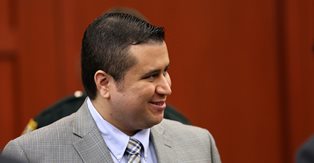 (CNN) -- A combative hearing four days before the start of George Zimmerman's second-degree murder trial saw attorneys spar over three key issues that may be critical to his defense. It didn't go well for the former neighborhood watch captain or his legal team.
(CNN) -- A combative hearing four days before the start of George Zimmerman's second-degree murder trial saw attorneys spar over three key issues that may be critical to his defense. It didn't go well for the former neighborhood watch captain or his legal team.
Zimmerman is charged in the Sanford, Florida, shooting death of Trayvon Martin on the night of February 26, 2012. He says he shot the 17-year-old in self-defense.
The shooting put a national spotlight on Zimmerman's hometown of Sanford, and sparked fresh debates about race relations and gun laws. The initial decision not to bring charges against Zimmerman led to the dismissal of the town's police chief and the appointment of a special prosecutor, who accused the homeowner of unjustly profiling and killing Martin.
Judge Debra Nelson denied the defense's first motion of the day, which requested the court protect the identities of three witnesses who wanted to remain anonymous.
"They're concerned they could be subject to ridicule or retribution," said defense lead attorney Mark O'Mara, trying to defend his motion. "They are very concerned, and may have to move out of their residence."
O'Mara said the three witnesses' testimony "will have impact on the jury's decision," noting they do not want to be involved in the case.
The second issue was whether the prosecution violated the rules of discovery by not submitting possibly damaging evidence found on Trayvon Martin's cell phone to the defense. A technology expert from the state attorney's office testified he found more than a thousand deleted photos on Martin's phone that were not included in the prosecution's original report. Those photos included pictures of naked women, marijuana and a hand holding a gun.
The technology expert said one deleted text also "looks like they were selling a gun."
O'Mara alleged that lead prosecutor Bernie de la Rionda lied when he said during a previous hearing that all information from the phone had been submitted. De la Rionda denied that claim and said the defense was invited to be present when the phone was being examined and processed.
The back-and-forth between the attorneys produced the day's most heated exchange, when defense attorney Don West became agitated while testifying and raised his voice, telling de la Rionda that "we caught you hiding the information!"
Nelson apparently was also agitated and cut O'Mara off as he was calling de la Rionda to the stand. She ruled at that time that the court will handle the discovery violation hearing after the trial, dealing another setback to the defense.
The court then moved to perhaps the hearing's most critical issue, regarding whether the technology used to analyze the voices on the 911 calls from the night of the shooting will be admissible. The technology may be key to the prosecution's case because their experts' testimony may be able to shed light on what was said between Zimmerman and Martin moments before the teenager was shot.
The law states that for technology to be admissible, it must be "generally accepted" in that particular field. Court documents indicate Zimmerman's attorneys will likely argue that the voice analysis technology does not meet the threshold of "generally accepted."
Defense expert Dr. Hirotaka Nakasone, an audio engineer for the FBI, expressed his doubts about using the recordings during his testimony. "A screaming voice is too far for us to address," said Nakasone. "It might mislead in the worst case."
In a statement released Thursday by Martin family attorney Ben Crump, Trayvon's family said,"It is ridiculous for the Zimmerman defense team to argue that expert voice analysts should not be permitted to testify at the trial. ... Expert voice analysis is necessary to assist in identifying the voices on the 911 tape."
However, court recessed for the day with Nakasone still on the stand. The crucial audio issue remains unresolved and will be addressed when the hearing continues Friday morning.
At that time, it is also possible the court will hear another key defense motion, on whether to ban the use of certain words and phrases in describing their client. Those words, which they fear may influence jurors, include "racist" and "vigilante."
Portland and Seattle
Free Subscription to Breaking News
Free Subscription to Breaking News























































































































































































































































































































































